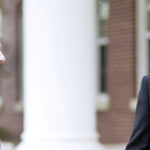Posted: 2/22/08
New Baptist Covenant criticism
continues to come from both left & right
By Hannah Elliott
Associated Baptist Press
NEW YORK (ABP)—Although organizers hailed a recent Baptist gathering as a success, some critics have leveled a wide array of charges against the celebration of a New Baptist Covenant.
Critics of the event, held in Atlanta in late January and early February, include conservatives who continue to accuse it of having a thinly veiled liberal political agenda. But they also include moderates and liberals who say the gathering was not inclusive enough of ethnic and sexual minorities.
| See complete coverage of the New Baptist Coverage meeting here. |
The Celebration of a New Baptist Covenant drew an estimated 15,000 Baptists to discuss working together despite denominational, ethnic, political and economic differences. Its headline organizers were the two living Baptists who have held the presidency—Jimmy Carter and Bill Clinton. Many observers praised the event as a momentous occasion that generated new unity, energy and focus for Baptists across North America.
But Carter’s and Clinton’s involvement in the event and the lack of official participation by the Southern Baptist Convention on a denominational level led many conservatives to criticize the celebration soon after it was announced in 2007. Although organizers made an effort to include prominent Baptist Republicans in the program, some conservatives have continued to criticize it.
Paul Proctor, in a column for the Nashville Tennessean, said the celebration achieved only an “image of unity,” which validated conservatives’ critique that liberals tend to promote “symbolism over substance.”
“As far as I’m concerned, outgoing SBC president Frank Page, who incidentally declined the invitation to attend, was right on calling the meeting a ‘smoke-screen left-wing liberal agenda,’” Proctor wrote.
“Carter can preach Christian unity all he wants, but he was the one who spurned the Southern Baptist Convention back in 2000. If anyone is guilty of promoting division among Baptists, it is the presidential peanut farmer from Georgia.”
More progressive Baptists also criticized the event for insufficiently displaying unity amid diversity.
Laura Cadena, a graduate of Baylor University’s Truett Theological Seminary and a member of Peachtree Baptist Church in Atlanta, said the meeting’s rhetoric of Baptist unity appealed to her, and she attended to observe it as well as see friends from her Texas seminary days. But, she added in an opinion column for EthicsDaily.com, the meeting proved to be a letdown when it came to representing all Baptist groups.
“I think that we could have done better, but it’s a beginning,” Cadena, 33, said. “I think that if the planning committee could have been more diverse—and by that I mean including more women, more young people, more Asian Baptists, maybe more Ghanaian Baptists—that would have been good.”
Cadena—a fifth-generation Texan of Hispanic background—also wondered why participants from her ethnic group were not better represented at the meeting. She asked whether there is “room in the family photo for Latino Baptists?”
“Where do we fit? Here in the South, Latinos are relatively new … there are not enough people that speak Spanish, there are not enough doctors that speak Spanish, there are not enough teachers that speak Spanish,” she said. “So what does a Hispanic church look like? I don’t know.”
Cadena said the meeting should have included specified time for networking between people from the same region or affinity group so that Latinos and other Baptists could have gotten to know each other better and exchange ideas about meeting needs in their community.
Todd Thomason, pastor of Baptist Temple Church in Alexandria, Va., wrote in a column submitted to Associated Baptist Press that he’s not convinced there is much new about the covenant celebrated at the meeting, especially when it comes to the issue of homosexuality.
Organizers decided not to allow the Association of Welcoming and Affirming Baptists or the Baptist Peace Fellowship of North America—two pro-gay groups—to participate in the event in an official manner, although they shared a booth in the exhibit hall.
The decision to exclude them, Thomason said, smacks of the “top-down exclusionary action” used by Southern Baptist leaders during the narrowing of the group’s policies in the last 20 years.
Champions of the New Baptist Covenant “cried foul when the leaders of the so-called ‘conservative resurgence’ seized the reins of power within the SBC and then circled the wagons, forcing out all who wouldn’t accept their narrow ideology or who dared to ask questions,” he wrote. “For these same Baptists to turn around now and disenfranchise other Baptists in much the same way (if not on the same scale) is the height of biblical hypocrisy.”
Covenant leaders like Leo Thorne, associate general secretary of American Baptist Churches USA, said the diversity of political opinion actually adds quality to the discussion.
“It doesn’t make any difference what decision you make or action you take, there are always people who use their freedoms to express disagreement,” Thorne said. “That’s rich. That’s energizing. That’s wonderful that we can have a diversity of opinions of issues. … If there are those who disagree, that is OK with me.”














We seek to connect God’s story and God’s people around the world. To learn more about God’s story, click here.
Send comments and feedback to Eric Black, our editor. For comments to be published, please specify “letter to the editor.” Maximum length for publication is 300 words.